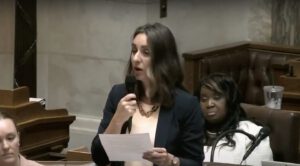Educational tax credits cover many beneficial educational services besides tuition
(The Center Square) – School tax credits pay for more than private school tuition, but those benefits rarely get as much discussion.
At the House Republican Policy Committee hearing on Friday…

(The Center Square) – School tax credits pay for more than private school tuition, but those benefits rarely get as much discussion.
At the House Republican Policy Committee hearing on Friday in northeast Philadelphia’s Holy Family University, however, policymakers focused on daycare and library programs that benefit from the Earned Income Tax Credit program. Testifiers emphasized how summer programs, extended daycare, and child-centered events all benefit from the non-school education spending.
“Over the years, these programs have positively affected families in ways that people don’t realize,” Rep. Josh Kail, R-Beaver, said. “This program again will be funded and well-funded because it does offer so many benefits to people across the board.”
The EITC gets funded by businesses that donate to scholarship funds that go toward pre-K groups, private schools, and “educational improvement organizations” such as libraries and other non-profits like public radio stations.
The program has a $263 million cap and almost 45,000 scholarships were awarded through the program in 2020-21 through more than 250 scholarship organizations.
Republicans have historically supported the EITC and its expansion while Democrats have been opposed.
Christi Buker, executive director of the Pennsylvania Library Association, spoke of the reach EITC-funded programs have for public libraries.
“Most libraries have reported that the EITC funds may be only 1%-2% of their total income, but they represent as much as 80% of children’s programming budgets,” Buker said. “They’re used in well-resourced and distressed communities.”
Though Pennsylvania has almost 470 state-aided public libraries, fewer than 10% are registered as education improvement organizations to qualify for EITC funding. But, Buker said, the funds have a big impact.
She noted that in Reading, libraries use the funds to teach children about healthy eating and food safety and give them basic culinary skills through a Food for Thought program.
“It seems more like a party than an education class,” Buker said. “The programming really is important for spurring on lifelong learning and that love of learning.”
If the EITC program grew, Buker said potentially more libraries would apply and it’d represent more opportunities to expand programs.
Zakiyyah Boone, CEO of Wonderspring Early Education in Philadelphia, which operates 10 child care centers in the area, argued the tax credit programs help kids and parents alike.
“Contributions given through the EITC directly support our pre-K children with preventing summer learning loss, extended day pre-K services so families can work, and help increase literacy outcomes at the kindergarten level,” Boone said.
Without the tax credits, Boone said they would have to cut summer programs and extended daycare that helps parents work.
“They lose the opportunity to remain gainfully employed and contribute to the economy in a meaningful way. Of course, that burden falls on women, more often women of color,” Boone said. “If they have to leave the workforce because they don’t have anyone to care for their children … That’s the kind of impact we’re talking about taking away: families’ ability to sustain themselves.”
The tax credit has a major impact beyond its economic effects, Boone argued.
“We could solve some more of our societal problems if we continue to fund (the EITC) at a strong level,” she said.
Parents using the EITC to get their children into private schools also praised it.
Ryan Haney, a parent of a student at Archbishop Ryan High School and the school’s soccer coach, argued that losing the EITC hurts schools directly, along with middle-class families who don’t qualify for other programs.
“Kids don’t have to fail just because their school is failing,” Kail said. “This program has shown us its success.”



